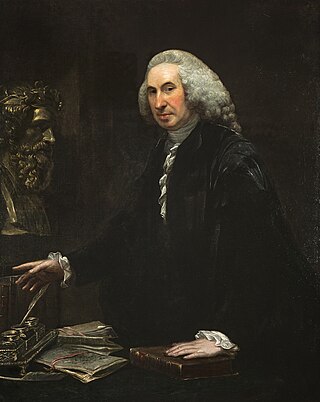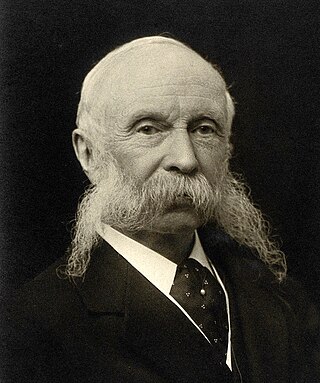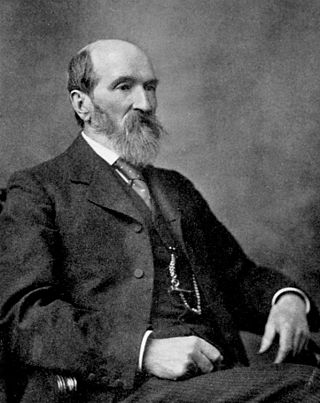Related Research Articles

William Cullen was a Scottish physician, chemist and agriculturalist, and professor at the Edinburgh Medical School. Cullen was a central figure in the Scottish Enlightenment: He was David Hume's physician, and was friends with Joseph Black, Henry Home, Adam Ferguson, John Millar, and Adam Smith, among others.

Sir David Ferrier FRS was a pioneering Scottish neurologist and psychologist. Ferrier conducted experiments on the brains of animals such as monkeys and in 1881 became the first scientist to be prosecuted under the Cruelty to Animals Act, 1876 which had been enacted following a major public debate over vivisection.

William Boyd, FRCPath, was a Scottish-Canadian physician, pathologist, academic, and author known for his medical textbooks.

Sir James Crichton-Browne FRS FRSE was a leading Scottish psychiatrist, neurologist and eugenicist. He is known for studies on the relationship of mental illness to brain injury and for the development of public health policies in relation to mental health. Crichton-Browne's father was the asylum reformer Dr William A.F. Browne, a prominent member of the Edinburgh Phrenological Society and, from 1838 until 1857, the superintendent of the Crichton Royal at Dumfries where Crichton-Browne spent much of his childhood.

Newmains is a village and former mining community on the eastern edge of Wishaw, North Lanarkshire, Scotland, 18 miles (29 km) south-east of Glasgow. Although it is considered by the local authority to have a town centre in its own right.

Sir John Batty Tuke PRCPE FRSE LLD was one of the most influential psychiatrists in Scotland in the late nineteenth century, and a Unionist Member of Parliament (MP) from 1900 to 1910. Tuke's career in Edinburgh from 1863 to 1910 spanned a period of significant social and political changes in asylum governance and care in Scotland. Tuke's professional success in public and private practice and his powerful role in several prominent medical societies allowed him to influence his colleagues toward a more physiological understanding of mental illness and its treatment.

Sir Thomas Smith Clouston was a Scottish psychiatrist.
Thomas Anderson was a Scotland international rugby union player; and also a Scotland international cricketer.
Charles Macfie Campbell (1876–1943) was a psychiatrist in the United States. He was President of the American Psychiatric Association.

Sir Thomas McCall Anderson was a physician and a professor of practice of medicine, at the University of Glasgow.

Edward Nathaniel Brush was an American physician, a mental hospital administrator, and an editor of psychiatric journals.

Charles Walker Cathcart, was a Scottish surgeon who worked for most of his career at the Royal Infirmary of Edinburgh (RIE). As a young man he had represented Scotland at rugby on three occasions. During the First World War he jointly published an account of the value of sphagnum moss as a wound dressing which led to its widespread use by the British Army for that purpose.

Dr Archibald Campbell Clark FFPSG (1852–1901) was a nineteenth-century Scottish physician who made major advances in mental health care philosophies.
David Morton was a Scotland international rugby union player. After his playing career, he became a rugby union referee.
Dr Nathaniel Thomas BrewisFRCPE FRCSE was a Scottish Doctor and international rugby union player. He became the 13th President of the Scottish Rugby Union.
Walter Irvine was a Scotland international rugby union player. He became a surgeon and was a Lieutenant Colonel in the Indian Medical Service.
Alexander Woodrow was a Scotland international rugby union player.

Sir William John Ritchie Simpson was a Scottish physician and specialist in tropical medicine.
Thomas Brown White was a Scotland international rugby union player and physician.
Leonard West was a Scottish international rugby union player.
References
- ↑ "George Robert Wilson". ESPN scrum. Archived from the original on 6 July 2013. Retrieved 15 November 2021.
- ↑ "The Glasgow Herald - Google News Archive Search". news.google.com. Archived from the original on 10 November 2021. Retrieved 15 November 2021.
- ↑ "Register" . Retrieved 17 March 2023– via British Newspaper Archive.
- ↑ "Register" . Retrieved 17 March 2023– via British Newspaper Archive.
- ↑ "Rugby Union - ESPN Scrum - Statsguru - Player analysis - George Wilson - Test matches".
- ↑ "Obituary". British Medical Journal: 786–787. 28 March 1908.